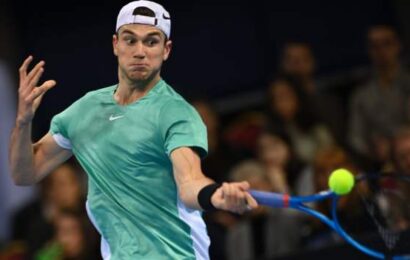One could count the all-time successful professional tennis players from Ecuador on one hand, and most of those fingers would be related to Andres Gomez, inarguably the greatest player from his country since the Open Era began in 1968.
Gomez, 62, who became one of the oldest players to win his first (and only) Grand Slam singles title when he won the French Open at 30 in 1990, is roaming the grounds of the Crandon Park Tennis Center, home of the Junior Orange Bowl International Championships (boys’ 14s and girls’ 12s), in his current role as coach for promising youngsters from his Gomez-(Raul) Viver Tennis Academy in Guayaquil.
“They need to see tennis in America,’’ said Gomez, who won 21 singles titles, 33 doubles titles, including two Grand Slams, and reached a career-high No. 4 in 1990. “They’re used to playing tournaments in Ecuador and South America. They should go at an earlier age to Europe and learn why the European [men] are dominating and winning all the Grand Slams.
“America has maybe 40 to 50 very good players at this age but when they get older many go to other sports because they get things before they even [turn pro]. In baseball [basketball and football], if you get a high draft pick you get a couple of million dollars. In tennis we have to earn it. That’s why more money must go to players in the earlier rounds so they can make a living.”
Gomez watched Ecuador teens Jaime Andres Ortiz and Lucas Yunez cruise past their first-round opponents, but saw the third player from his academy, Felipe Wright, fall 6-1, 6-2 to ninth-seeded Yannick Theodor Alexandrescou of Romania. Emilio Camacho, a Venezuelan living in Quito, Ecuador, who trains occasionally with Gomez, advanced in straight sets.
“He’s a legend and an inspiration for all tennis players from my country,’’ said Ortiz, 14. “He has great stories to tell us and can teach me a lot of things about tactics. I’m also lefty like him so that helps with my slice serve and open forehand.”
Gomez’s nephew Roberto Quiroz is ranked 308th. His 31-year-old son Emilio is 105th and hoping to get straight into the Australian Open.
Gomez realizes how hard it is for a son to follow in his father’s famous footsteps, something that Cruz Hewitt is learning as well. Hewitt is the son of Aussie great and former No. 1 Lleyton Hewitt, who was watching the 17th-seeded Cruz vanquish Izyan Ahmad of Wayne, New Jersey, 6-2, 6-4 on a nearby court.
“I’m proud of Emilio when he broke the top 100 [98 this year] because I know how hard he worked for it,’’ Gomez said. “It’s not an easy task because they always compare. Everybody should take on their own accomplishments. For [Hewitt], it’s going to happen, too, but the only way for it not to happen is not to go to tournaments with him.”
The young Hewitt, who grew about five inches since reaching the second round here last year, said he hopes to win the US Open someday like his dad did in 2001 (Wimbledon title in 2002). Similar to his father — the Aussie Davis Cup captain — Cruz has the same prematch, psyche-up ritual.
“I love Rocky’s, ‘The Eye of the Tiger’’ he said with a smile. “Also, the French soccer World Cup team’s theme song, ‘ring the Cup Back Home.’”
Hewitt will next play Jou-George Gnjidic of Germany, who outlasted 12-year-old Bulgarian-American Teodor Davidov, 4-6, 7-6 (9-7), 7-6 (7-4). Davidov, who trains at Inspiration Academy in Bradenton, has been nursing a sore left shoulder, which hampered his ambidextrous ground game and serve. Lleyton Hewitt, who tries to stay in the shadows, scouted the match.
While Gomez lost early in his only trip to the Orange Bowl 18s, his cousin Nicolas Lapentti won the Orange Bowl 18s in 1994 and his brother Giovanni won the OB 16s in 1999. Nicolas reached a career-high No. 6 in 2000, won five titles and was a semifinalist in the Australian Open in 1999. Viver won the OB 18s in 1979 but was only ranked a career-high 94th in 1988.
Long before Gomez, Pancho Segura was Ecuador’s tennis king, and was unofficially No. 1 in the world in the early 1950s. Segura had a dual Ecuador-U.S. citizenship and was known for his trademark two-handed forehand, which he utilized while playing for the University of Miami.
Gomez, who has Hall of Fame credentials, has good and bad memories of this tennis center where he couldn’t get out of the round of 16 when the Miami Open Masters was held here.
“Many Ecuadorians came to cheer me on,’’ Gomez said. “It was a great atmosphere. But I lost like seven times in the round of 16.’’
Actually, it was four times from 1986 to 1990 when he lost to three former No. 1s in Andre Agassi, Mats Wilander and Ivan Lendl, as well as Plantation’s Jay Berger.

















